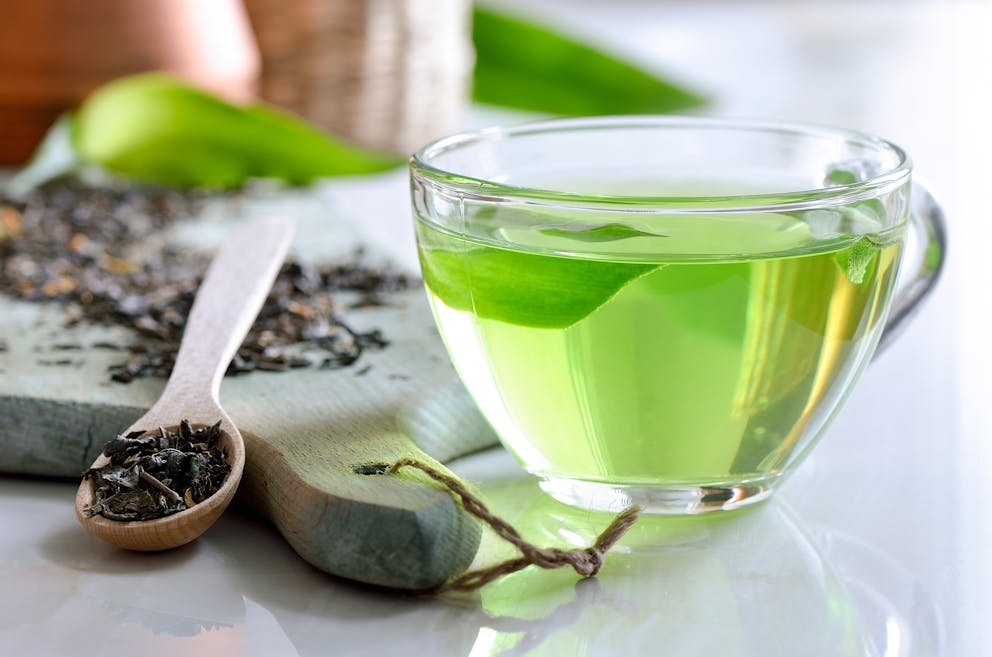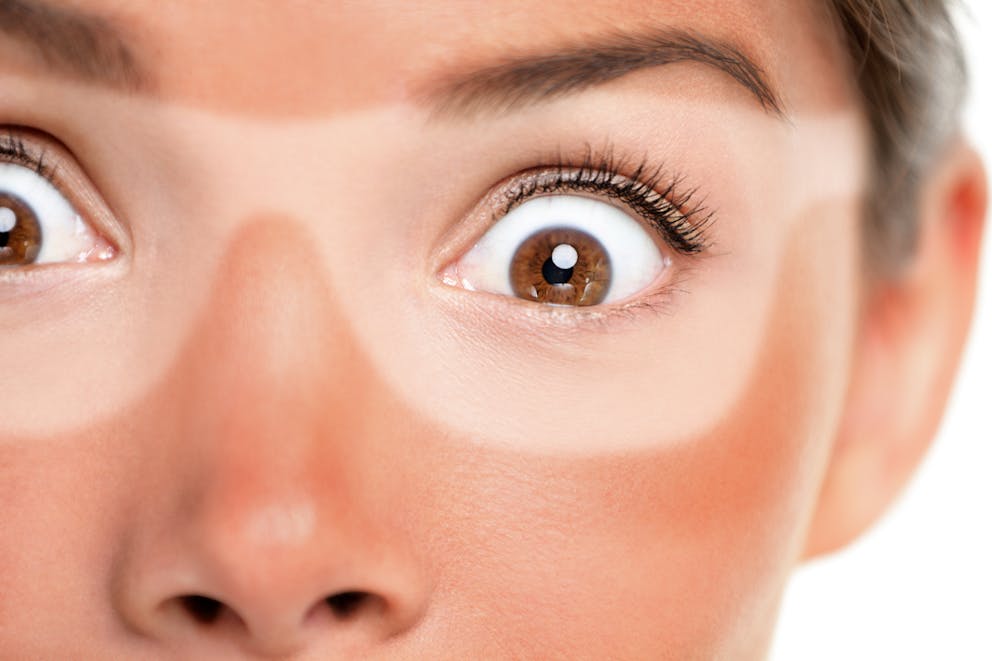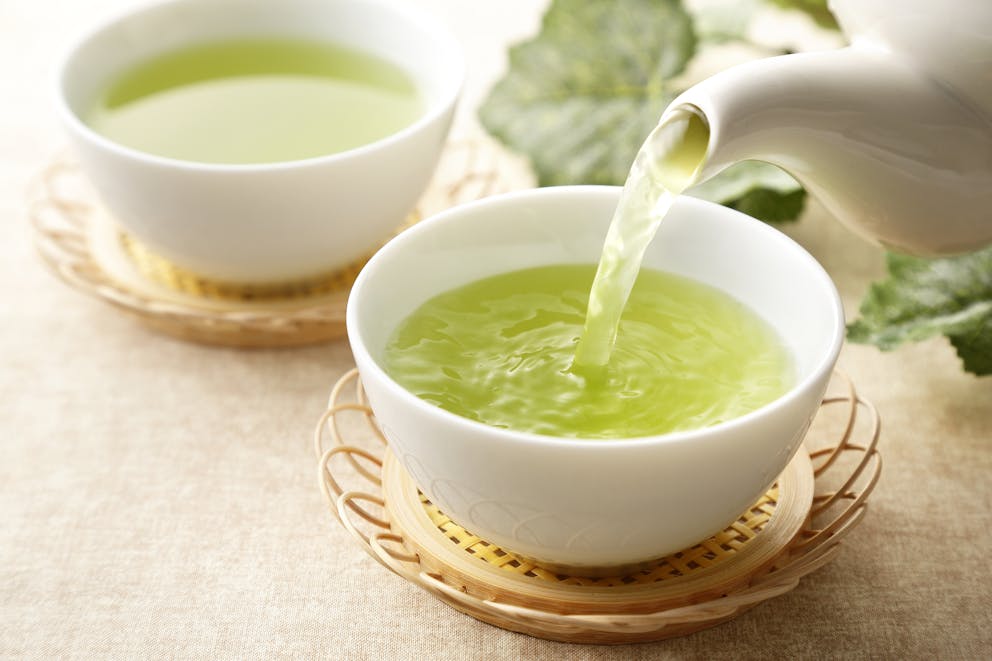9 Green Tea Benefits for Skin Health
Green tea has been revered for millennia, not just as a staple beverage but for its impressive health benefits, including those for the skin.
Let's uncover nine green tea benefits for skin health and discover how to incorporate it into your daily beauty routine.

What is green tea?
Green tea is made from the fresh tea leaves of the Camellia sinensis plant.
Unoxidized green tea leaves contain a high concentration of catechins, a type of polyphenol, which are natural antioxidant compounds found in various plants.
One of the most studied green tea polyphenols is epigallocatechin gallate (EGCG), which is known for its powerful antioxidant properties.
In comparison, black tea is also derived from the same plant as green tea but undergoes different processing in which the leaves are fully oxidized. This oxidation process alters polyphenol concentrations and leads to a higher tannin content.
Research published by The American Journal of Clinical Nutrition has found that consumption of foods or beverages with a high tannic acid content can inhibit the absorption of essential nutrients, including thiamine, also known as vitamin B1, which can cause thiamine deficiency.
Due to its delicate processing, green tea is considered more nutritious than black tea and is often the primary focus of scientific research for its variety of health benefits and applications.
Check out this video to discover the amazing benefits of drinking green tea.
9 skin benefits of green tea
Let’s uncover some of the impressive benefits of green tea for the skin.
1. Reduces skin inflammation
For those struggling with acne vulgaris, rosacea, and other inflammatory skin disorders, green tea extract may offer a natural solution.
Research published in Molecules found that the abundance of polyphenols in green tea has impressive anti-inflammatory properties that can aid in reducing skin redness, skin irritation, and swelling.
The natural compounds in green tea can soothe irritated skin and contribute to overall skin health by reducing oxidative stress, making green tea a beneficial tool for managing several inflammatory skin conditions.

2. Protects against sun damage
Photoaging refers to the aging of the skin due to prolonged exposure to solar ultraviolet (UV) radiation. This can manifest in a variety of skin issues, such as wrinkling, loss of elasticity, and changes in pigmentation.
A recent study in Nutrients highlighted antioxidants such as EGCG, with their powerful antioxidant, anti-inflammatory, and regenerative properties, as promising agents in counteracting UV-induced radiation damage.
3. Promotes autophagy
Green tea polyphenols have been observed to stimulate a crucial biological process called autophagy.
Autophagy is the body's way of cleaning out and recycling old damaged cells to regenerate newer, healthier cells.
"Autophagy is a fascinating repair mechanism that reduces inflammation, extends lifespan, and has anti-cancer and anti-aging properties," explains Dr. Berg.
Autophagy regulates the process of recycling old cells, which is crucial for supporting the health, maintenance, and protective functions of skin cells, essential for healthy-looking skin.

4. May improve skin hydration
A study found that applying green tea topically in cosmetic formulations with six percent green tea extract can significantly boost skin moisture and reduce skin roughness over 30 days.
This long-term moisturizing effect and improved skin elasticity and texture demonstrated green tea extract as a potent topical ingredient for enhanced hydration, anti-aging, and an overall healthier glow.
5. Helps manage oily skin
Another important attribute of green tea polyphenols is their natural antimicrobial properties, which help protect the skin from bacterial and fungal infections.
Research published in Antioxidants showed that the combination of the antimicrobial and anti-inflammatory effects of green tea polyphenols can be an effective treatment for both oily skin and acne.
Green tea, in both topical and oral applications, has been found to effectively reduce the production of sebum, the natural skin oils produced by sebaceous glands, which can help reduce oily skin.
6. May help prevent premature skin aging
Green tea may offer promising skin-rejuvenating and anti-inflammatory properties.
A study published in Internal Journal of Molecular Sciences demonstrated green tea's effectiveness in hydrating the skin and retaining moisture, which is pivotal in slowing down the process of skin aging.
Additionally, green tea’s ability to combat free radicals may be an effective remedy for sun-related skin damage, offering a natural solution to prevent early signs of aging.
7. Reduces the appearance of cellulite
Green tea extract has shown promising results in reducing cellulite.
Its benefits for cellulite management are attributed to the metabolic effects of green tea’s caffeine and catechin concentrations, which have been found to promote fat-burning and metabolic health linked to a lower risk of cellulite.

8. Collagen Support
Collagen provides structure, strength, and elasticity for the skin. As we age, collagen production decreases, leading to common signs of aging, such as wrinkles, fine lines, and a loss of skin elasticity.
The antioxidant properties of green tea extract have been discovered to block collagen breakdown and reduce collagen crosslinking.
As a result, green tea can provide effective collagen support and support the skin's suppleness, and elasticity, and can help prevent the formation of wrinkles.
9. May decrease skin cancer risk
Certain polyphenols in green tea have potential antimicrobial, anti-inflammatory, and anti-cancer properties.
A key factor in the onset of skin cancer is attributed to UV radiation damage to skin cell DNA. This damage can interfere with normal skin cell functions and potentially lead to mutations and, in the long term, skin cancer.
Research published in the Archives of Biochemistry and Biophysics highlights that polyphenols, such as EGCG, stand out for their ability to support the skin's natural DNA repair mechanisms.
As a result, green tea polyphenols can help mitigate the risks associated with UV exposure, particularly the long-term risk of developing skin cancers such as basal cell carcinoma, squamous cell carcinoma, and potentially melanoma.
Both consumption and topical application of green tea extracts have demonstrated varying degrees of effectiveness in DNA repair, contributing to the prevention of skin cancer.

How to use green tea for skin health
Here are several ways to incorporate green tea into your skin health routine.
1. Green tea face mask
You can make a simple green tea facial mask by mixing one tablespoon of green tea powder with one teaspoon of honey to form a paste.
Honey is known for its moisturizing and antibacterial properties, which can complement the skin-health-promoting effects of green tea.
You can also add a teaspoon of aloe vera gel to the mix for an added boost of antibacterial and anti-inflammatory properties.
Apply the mask to your face, leave it on for about 15 to 20 minutes, and rinse off with warm water.
This mask can help reduce inflammation and provide antioxidants directly to the skin.
2. Green tea bags
Saving used green tea bags can be a cost-effective and simple way to enjoy the skin benefits of green tea.
Used green tea bags can be placed on the eyes to reduce puffiness and dark circles.
Ensure the tea bags are cool and moist before applying them to your eyes for about 10 to 15 minutes.

3. Drinking green tea
Regular consumption of green tea contributes to overall health, including skin health.
The polyphenols in green tea can help protect the skin from UV damage and improve skin elasticity.
Drinking between 1 and 3 cups of green tea or matcha green tea daily can be an excellent way to incorporate this health-promoting beverage into your daily routine.
However, remember to consume green tea in moderation to avoid potential side effects from excessive caffeine intake, such as headaches, dehydration, and restlessness.
4. Green tea extract supplements
Green tea extract supplements can be an excellent alternative for those who don’t like drinking tea and are widely available in capsule, tablet, or tincture form.
It's important to follow the dosage recommendations on the product label and consult a healthcare professional before starting any new supplement, especially if you have existing health conditions or are taking other medications.

Key takeaways
There are several green tea benefits for skin health due to its potent anti-inflammatory, antimicrobial, anti-aging, antioxidant, and potential anti-cancer properties.
Rich in polyphenols like EGCG, green tea can soothe skin inflammation, protect against sun damage, and aid DNA repair.
Regular, moderate consumption of green tea is recommended for overall skin health, but excessive intake should be avoided to prevent potential side effects of excessive caffeine intake.
FAQ
1. Can drinking green tea improve your skin health?
Yes, drinking green tea can improve skin health due to its rich polyphenol content.
2. What are the top benefits of green tea for skin health?
Green tea supports skin health by reducing skin inflammation, protecting against sun damage, stimulating autophagy and skin cell renewal, and slowing signs of premature aging.
In addition, green tea has potent antioxidant, anti-microbial, and anti-cancer properties that support healthy skin cell function and promote overall skin health.
3. How often should you drink green tea for clear skin?
For clear skin, it's suggested to drink between 1 and 3 cups of green tea daily. Excessive consumption should be avoided to prevent potential side effects like caffeine sensitivity.
4. Is it safe to drink green tea every day?
Yes, it is generally safe to drink green tea every day in moderation.
5. What is the best way to use green tea for skin health?
The best ways to use green tea for skin health include drinking green tea, using green tea face masks, applying cooled green tea bags to the skin, and taking green tea supplements as per recommended dosages.
6. How do I use green tea on my face?
You can use green tea on your face by applying a homemade mask made from green tea powder and honey or placing cooled green tea bags on your skin, especially on the eyes, to reduce puffiness and dark circles.
Sources
Previous blog
9 Science-Backed Benefits of Turmeric and CurcuminNext blog
The Best Mineral for Strong BonesTags

Popular
08/21/2024
47.3K views
05/22/2024
41.4K views
11/18/2024
245.7K views
03/18/2024
11/21/2022




